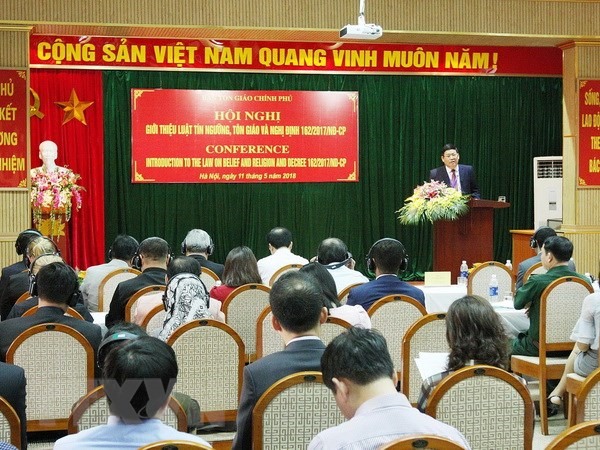 Society
Society

The Government Committee for Religious Affairs held a conference in Hà Nội yesterday to introduce the Law on Belief and Religion, and a decree stipulating a number of articles of the law and enforcement measures to ambassadors and representatives of diplomatic agencies in Hà Nội as well as domestic ministries and agencies.
 |
| The Government Committee for Religious Affairs held a conference in Hà Nội yesterday to introduce the Law on Belief and Religion, and a decree stipulating a number of articles of the law and enforcement measures to ambassadors and representatives of diplomatic agencies in Hà Nội as well as domestic ministries and agencies.— VNA/VNS Photo Nguyễn Dân |
HÀ NỘI — The Government Committee for Religious Affairs held a conference in Hà Nội yesterday to introduce the Law on Belief and Religion, and a decree stipulating a number of articles of the law and enforcement measures to ambassadors and representatives of diplomatic agencies in Hà Nội as well as domestic ministries and agencies.
Vũ Chiến Thắng, Head of the Government Committee for Religious Affairs, said that while considering belief and religion the demand of people, along with socio-economic development policies, Việt Nam has over the years created favourable conditions for religious activities of people, including foreigners in Việt Nam.
As part of efforts to complete legal frameworks on religion, create a favourable legal corridor for religious activities and lay a foundation for agencies to improve their management, the 14th National Assembly adopted the Law on Belief and Religion and gave the Government a year to stipulate the details of several articles of the law and measures to enforce it, said Thắng.
Deputy Head of the committee Bùi Thanh Hà said Việt Nam is home to many ethnic minorities and religions. More than 95 per cent of the Vietnamese population has practised belief or religion.
By the end of June 2017, the State had recognised or granted operation registration certificates to 41 organisations of 15 religions with about 25.3 million followers, accounting for 27 per cent of the population, a rise of 35 per cent from 2003, along with 60,799 dignitaries, 133,662 religious workers and 27,916 worshipping establishments, said Hà.
Over the years, religious followers have made positive contributions to national construction and defence. All recognised organisations have operated in tandem with the nation and in line with the law, while most religious dignitaries and followers have engaged in patriotic, charitable and poverty reduction movements.
Việt Nam has been working to observe the rights to freedom of belief and religion of all people, including foreign nationals legally residing in Việt Nam.
However, Hà also pointed to some problems in religious affairs, including cases of social disorder, law violations in religious activities and the moral degradation of some religious dignitaries. Particularly, there have been some cases of abusing religion to incite people to cause social disorder and harm national unity, he said.
He said the key principle in the State policy on belief and religion was to respect freedom of belief and religion of all people. "Everyone has the right to follow or not follow a belief or religion, and rights are respected and observed by the State and that all religions are equal before the law," he said.
The official also briefed the participants on new and major contents of the Law on Belief and Religion and the Government’s Decree 162/2017/ND-CP. — VNS




